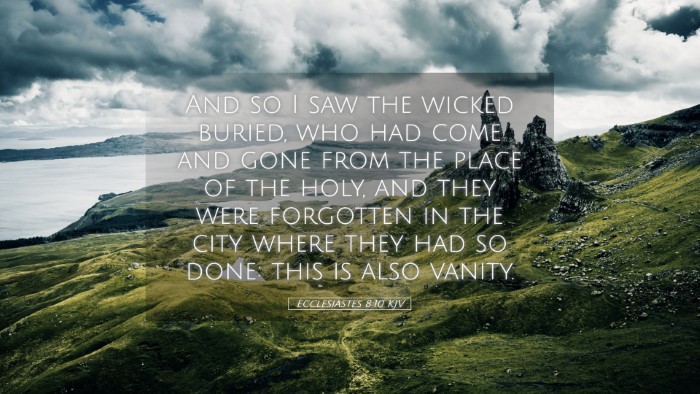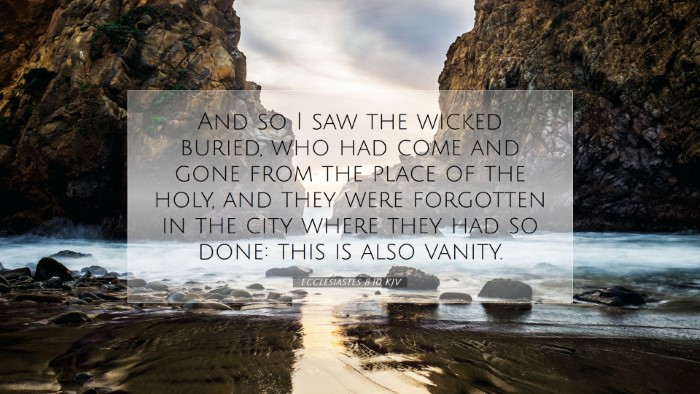Ecclesiastes 8:10 Commentary
Verse: "Then I saw the wicked buried, who had come and gone from the place of the holy, and they were forgotten in the city where they had so done: this also is vanity."
Introduction
The book of Ecclesiastes, attributed to King Solomon, presents reflections on the meaning of life, the futility of human endeavors, and the ultimate fate of individuals irrespective of their moral standing. Ecclesiastes 8:10 encapsulates a poignant observation regarding the fate of the wicked and the recognition of their deeds. This commentary draws on the insights of notable public domain scholars including Matthew Henry, Albert Barnes, and Adam Clarke to unravel the richness of this verse.
Contextual Analysis
The overarching theme of Ecclesiastes is the search for meaning amidst the apparent randomness of life. Ecclesiastes 8 discusses the authority of the king and the interactions of the wise and the wicked. This verse forms part of the observation on the cyclical nature of life, emphasizing the transient nature of human memory and reputation.
Insights from Matthew Henry
Burial and Legacy: Henry notes the irony in the proper burial of the wicked. He states that despite their wickedness, they receive the honor that accompanies a burial. This honor contrasts their lives of moral failure, suggesting a discrepancy between outer appearances and inner truth.
Forgetting the Wicked: The phrase "they were forgotten" signifies the fleeting nature of human remembrance. Henry suggests that just as the wicked can enjoy temporal peace through death, they ultimately face the reality of being erased from memory—further underlining the vanity of humans placing significance on reputations accumulated through sin.
Insights from Albert Barnes
The Place of the Holy: Barnes elaborates on "the place of the holy," which can be interpreted as the temple or societal moral norms. The wicked, having frequented these sacred places, illuminate the hypocrisy often present in their lives. Their evil deeds, juxtaposed with their religious appearances, call into question the authenticity of their worship.
The Nature of Vanity: Barnes emphasizes the vanity of their actions and the seeming lack of divine retribution in this life. He draws attention to how public life allows for evil individuals to prosper and be memorialized, leading to a contemplation about divine justice—wherein the true judgment awaits beyond death.
Insights from Adam Clarke
Observational Wisdom: Clarke highlights the observations made by the Preacher (the author of Ecclesiastes) as a form of wisdom gained through experience. He insists that witnessing the burial of the wicked reflects a grim reality where death does not discriminate between the righteous and the unrighteous.
Transfer of Memory: Clarke states that even in death, the essence of the wicked is overshadowed by the larger scope of human history, further enforcing the idea that during their lifetime, the trivia of their actions gains more significance than their demise. It points to the somber truth that many are forgotten despite their notoriety, reflecting the ephemeral nature of human life and legacy.
Theological Implications
This verse raises profound theological questions regarding justice, remembrance, and the afterlife. It prompts a discussion on God's ultimate judgment versus the immediate outcomes perceived in life.
- Divine Justice: Many theologists interpret this verse as an affirmation that while humans may fail to see justice enacted in life, God’s sovereignty ensures that all evil will eventually be accounted for.
- The Nature of Memory: The text confronts the notion of how much weight we place on earthly reputation compared to a legacy defined by one's relationship with God.
Practical Applications
Pastors and theologians can draw numerous lessons from this verse:
- Encouragement for the Righteous: This verse can be a source of hope for believers who struggle against injustice, reassuring them that true justice lies in God’s timing.
- Warning Against Hypocrisy: It serves as a caution to both leaders and laypersons in behaving authentically, ensuring that their exterior actions align with their inner convictions.
- Focus on Eternal Legacy: The text invites reflection on how one is remembered beyond death, encouraging believers to prioritize acts that align with their faith and values.
Conclusion
Ecclesiastes 8:10 encapsulates an essential aspect of human existence, drawing attention to the paradoxes and complexities surrounding life, death, and memory. The insights from Matthew Henry, Albert Barnes, and Adam Clarke illuminate the universal truths that resonate with the human experience, challenging readers to reflect on their own lives in accordance with divine wisdom.


